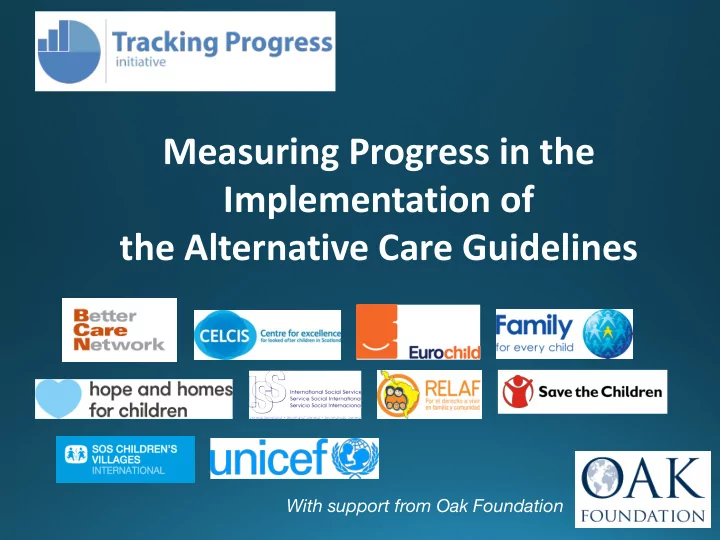

Measuring Progress in the Implementation of the Alternative Care Guidelines With support from Oak Foundation
Background to the Tracking Tool • Adoption of Guidelines for the Alternative Care of Children by UN General Assembly (2009) • Greater awareness of harmful impact of institutionalisation • Focus on preventing child-family separation and ensuring alternative care used ONLY when necessary and appropriate • Support for national level implementation of the Guidelines.
Inter-agency support to implement Guidelines The Handbook Massive Online Open Course The Tracking Tool
Overview of the tool • Tracking progress tool developed by inter-agency group • To support national level actors measure progress in the implementation of the Guidelines • Designed for diverse range of country contexts (i.e. type of child welfare system, stage of development of care system, economic development and political commitment)
WEB BASED INTERACTIVE TOOL OPEN SOURCE
FRAMED BY THE ALTERNATIVE CARE GUIDELINES Q2 Q1 Is the care appropriate for the child? Is care genuinely needed? Ensure that the care settings meets the needs Ensure formal alternative of the child care settings meet Discourage recourse to minimum standards alternative care Reduce the perceived need for formal alternative care The Suitability Principle The Necessity Principle
FOUR OVERARCHING THEMES
TO INPUT AND TO IDENTIFY GAPS IN TO IDENTIFY SHARE DATA DATA PRIORITIES and (Qualitative and HOW TO ADDRESS Quantitative) THEM
REPORT DATA MEASURE CHANGE ANALYSE THE DATA REPEATEDLY OVER TIME TRACKING PROGRESS UNDER EACH KEY THEMES
Using the Tracking Tool • Best supported by national Working Group of key actors working on children’s care and care reforms • Working group ideally brings together Government, UN Agencies and civil society organisations • Free and open source means tool can also be evolve with needs in context and over time • Owned and managed at the national level: Data and tool can be hosted on local server or global server
Piloting of the tool • Piloting of tool will take place in 5 countries • Countries selected identified according to ensure geographical representation, socio- economic contexts, types of care systems at different stages of development or reforms • Some support provided for 1 year (IT, technical) • Contribute to learning and further development of the tool, including guidance. • Other countries invited to test tool outside of formal pilot
Any question? Co-chairs of the Inter-agency Steering Group: Florence.martin@bettercarenetwork K.Rice@savethechildren.org.uk
Recommend
More recommend